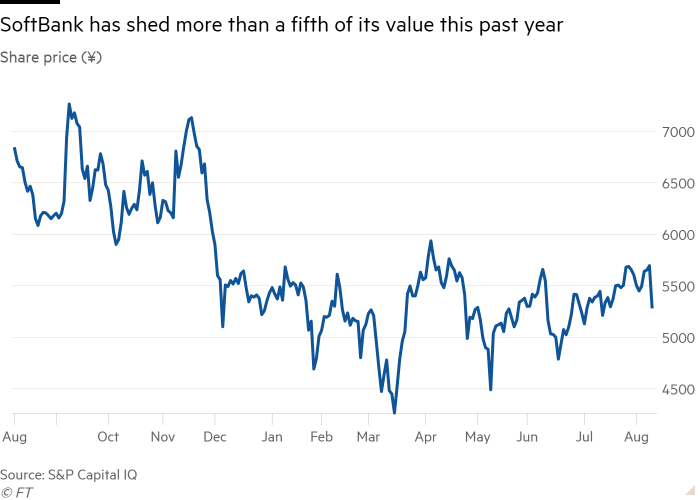SoftBank’s record $23bn loss could push Masayoshi Son to reconsider taking group private
SoftBank’s record $23.4bn quarterly loss, a pledge of heavy cost-cutting and an hour of public self-criticism by its founder Masayoshi Son could push the Japanese billionaire to reconsider a management buyout of the technology conglomerate.
Analysts and investors said the latest results, which delivered fresh signs that SoftBank is preparing to sell key operations such as Fortress Investment Group and focus more exclusively on its two Vision Funds, raised questions over whether it still needed to be listed at all.
People close to the company confirmed that Son has discussed the option of taking SoftBank private on several occasions over the past three years, but had always rejected the idea, in part because of pressure from the company’s biggest Japanese banking lenders, notably Mizuho.
The revived debate on SoftBank’s future as a listed company follows the announcement on Monday of a second consecutive quarter of record losses, driven mostly by the underperformance of its flagship Vision Funds as global tech valuations have collapsed.
SoftBank’s unprecedented spew of red ink in the April to June quarter sent shares in the company 8 per cent lower during Tuesday trading, as investors weighed whether, without a rebound in global tech stocks, SoftBank could later be forced into further valuation writedowns on the unlisted portion of its Vision Fund portfolios.

In a note to investors published late on Monday, SMBC Nikko analyst Satoru Kikuchi argued that once the initial public listing of the British chip designer Arm was complete, SoftBank would be a pure investment company and a fundraising vehicle.
“It is raising these funds with debt, so there is little reason to be listed on the stock market,” said Kikuchi, who, along with other analysts, identified a distinct change of strategy by Son as management appeared to now prioritise defence of the balance sheet over the kind of swashbuckling appetite for risk on which SoftBank had made its name.
“We think changes in the very form of the company, for example an MBO, could be coming in the not-too-distant future,” said Kikuchi.
SoftBank declined to comment on whether delisting was an option for the company.
Mitsushige Akino, chief investment officer at Ichiyoshi Asset Management who had already sold out of the fund’s investment in SoftBank before Monday’s numbers, said that MBO talks were a possibility and that ultimately Son might choose to relist SoftBank in the US to achieve a higher valuation for the company.
Meanwhile, said Akino, the big question left by Monday’s numbers was whether Son, as an investor, was a true expert and a professional. “Perhaps he is just a rich amateur . . . Son is not a superstar. Looking at cause and effect, he is in a tough situation now because he bought stocks at a high price,” said Akino.
During SoftBank’s press conference, Son struck a heavily downbeat tone and made repeated reference to the need for “self-reflection”.
“MBO talk around SoftBank could accelerate from here on, but it may come across as a least worst option. When you look at it more closely, an MBO is an increasingly hard deal to do because the company is so heavily indebted,” said Pelham Smithers, a longtime independent analyst of SoftBank.
Son also warned that the “winter” for unlisted stocks in the portfolio could be longer than for their listed counterparts, adding to investor concerns that there will be further valuation writedowns. In its results statement, SoftBank recorded unrealised losses of $2.3bn for unlisted stocks in Vision Fund I (SVF1) and $6.6bn for those in Vision Fund II (SVF2).
His comments come just a week after the news that the flagship portfolio of Tiger Global — the high-profile hedge fund that made its name for high exposure to US and Chinese technology investments — had ended the first half of the year 50 per cent down after fees.

David Gibson, an analyst at MST Financial Services, said the unlisted portions of SoftBank’s holdings could take another 12 to 18 months to reset, though he noted that more than 80 per cent of SVF companies now had enough cash to sustain them for two years. Gibson pointed to the example of Klarna, the Swedish fintech group, which in July raised $800mn at a valuation of $7bn, or roughly one-seventh of the $46bn valuation it commanded when SoftBank bought into the company in June 2021.
“The shares will struggle to perform in tough capital markets. The stock is a leveraged play into the availability of capital and higher tech valuations longer term,” said Gibson.
Others said the performance continued to cast a negative light on SoftBank’s judgment as an investor.
Kirk Boodry, a Redex Research analyst writing on the Smartkarma platform, said SoftBank’s investment losses over the past two quarters had left the two Vision Funds roughly where they were two years ago before the tech rally and subsequent hangover.
“One big takeaway is that the accelerated investment pace set by Vision Fund 2 has generated a 20 per cent negative return in two to three years. The ‘positive’ spin is that reflects a weak market for tech but it also raises questions (again) on due diligence and/or whether competition between SoftBank and other private equity firms led to everyone paying over the odds,” said Boodry.
For all the latest Business News Click Here
For the latest news and updates, follow us on Google News.
